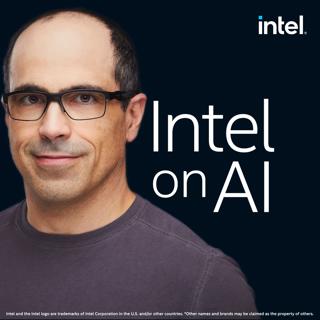
AI & the Developing World with Ed Hsu – Intel on AI – Season 2, Episode 3
In this episode of Intel on AI guest Edward (Ed) Hsu, senior adviser of disruptive technologies at World Bank, joins host Abigail Hing Wen to talk about how AI will continue to impact the developing world. Ed sits at the intersection of one of the world’s oldest problems—global poverty—and newest solutions—artificial intelligence. His role includes managing special initiatives and developing partnerships with multinational technology companies. Ed and Abigail discuss how AI is being applied to the developing world, the challenges being faced, and how companies can help ensure technological gains aren’t only being made in certain sectors of the global economy. Follow World Bank on Twitter at: twitter.com/worldbank Follow Abigail on Twitter at: twitter.com/abigailhingwen Learn more about the future of AI at: intel.com/ai
6 Loka 202034min

Smart Robots: From the Lab to the World with Pieter Abbeel – Intel on AI Season 2, Episode 2
In this Intel on AI podcast guest Pieter Abbeel, one of the world’s leading AI roboticists, joins host Abigail Hing Wen to talk about bringing AI robots into the world. Professor Pieter Abbeel is Director of the Berkeley Robot Learning Lab and co-director of the Berkeley Artificial Intelligence (BAIR) Lab. Abbeel’s research strives to build ever more intelligent systems, pushing the frontiers of deep reinforcement learning, deep imitation learning, deep unsupervised learning, transfer learning, meta-learning, and learning to learn. His lab also investigates how AI could advance other science and engineering disciplines. Pieter and Abigail discuss why twenty years from now almost all robots will be learning robots and how technology can help make that transition happen now. Follow Pieter on Twitter at: twitter.com/pabbeel Follow Abigail on Twitter at: twitter.com/abigailhingwen Learn more about the future of AI at: intel.com/ai Learn more about the future of AI at: intel.com/ai
30 Syys 202037min

The Future of AI with Andrew Ng – Intel on AI Season 2, Episode 1
In this Intel on AI podcast episode guest Andrew Ng joins host Abigail Hing Wen to talk about the future of AI. Artificial intelligence has so much buzz around it, but only a handful of people understand it as deeply as Andrew Ng. Andrew brings his perspective as an expert in the field and as global citizen, starting from his days as the founding leader at Google Brain, leading AI at Baidu, and serving as an adjunct professor in computer science at Stanford University. Among Andrew’s other pursuits: being the founder of deeplearning.ai, the founder and CEO of Landing AI, a general partner at AI Fund, and chairman and co-founder of Coursera. Andrew and Abigail discuss why most of the important work yet to be done with AI is in industries outside of Silicon Valley, such as manufacturing, agriculture, and healthcare, highlighting specific examples of where AI will bring value and transform several sectors of society. Follow Andrew on Twitter at: twitter.com/andrewyng Follow Abigail on Twitter at: twitter.com/abigailhingwen Learn more about the future of AI at: intel.com/ai
16 Syys 202040min

Relaunch with host Abigail Hing Wen – Intel on AI Season 2, Episode 0
The Intel on AI podcast is relaunching with New York Times best-selling author Abigail Hing Wen as the new host. Focusing on interviews with the world’s most interesting AI experts, the Intel on AI podcast covers a wide range of topics, including applications, strategy, ethics, policy, entertainment, scientific research, and society’s future. Previously, the podcast ran for over sixty episodes and featured Intel partners and AI business leaders. Future episodes will include guests such as: • Andrew Ng, co-founder of Coursera, adjunct professor of computer science at Stanford University, and former head of Baidu AI Group and Google Brain • Pieter Abbeel, professor at Berkeley Artificial Intelligence Research (BAIR) Lab • Ed Hsu, senior adviser of disruptive technologies at ?World Bank Group • Sandra Rivera, executive vice president and chief people officer at Intel Host Abigail Hing Wen is the author of the New York Times best-selling novel Loveboat, Taipei, a contributor to Forbes and Fortune, and has been seen on Bloomberg, NBC News, and more. She holds a BA from Harvard and JD from Columbia. Follow Abigail on Twitter at: twitter.com/abigailhingwen Learn more about the future of AI at: intel.com/ai
10 Syys 20201min

Empowering Enterprise AI with Cloudera Data Platform – Intel on AI – Episode 67
In this Intel on AI podcast episode: Enterprises today are investing in machine learning (ML) and artificial intelligence (AI) to transform their business and optimize existing workflows. Yet, knowing how to implement AI and ML in your business can be very challenging. Ali Bajwa, the Director of Partner Solutions Engineering at Cloudera, joins the Intel on AI podcast to discuss how Cloudera has recently launched the Cloudera Data Platform (CDP) which is an integrated analytics and data management platform offering broad data analytics and artificial intelligence functionality along with secure user access and data governance features. Ali describes how CDP can be deployed on cloud services or in private data centers and provides enterprises with powerful features to address almost any of your AI business needs. Ali also describes how CDP is optimized for Intel architecture including 2nd Generation Intel Xeon Scalable Processors, Intel Optane DC Persistent Memory and Intel Ethernet providing their customers the incredible performance and flexibility that Intel technologies provides. To learn more, visit: cloudera.com Visit Intel AI Builders at: builders.intel.com/ai
12 Elo 202017min

Driving AI Adoption with DataRobot and Intel Optane DC PMM – Intel on AI – Episode 66
In this Intel on AI podcast episode: Organizations want to get insights from their data but face barriers to adopting machine learning (ML) and AI including lack of data science expertise in the global workforce, exorbitant costs, lack of guidance, and time commitments of traditional modeling methods. Ben Taylor, the Chief AI Evangelist at DataRobot, stops by the Intel on AI podcast to discuss how the DataRobot enterprise AI platform enables organizations build and deploy accurate ML models in a fraction of the time needed in comparison with traditional data science methods. He describes his work helping organizations overcome many of the obstacles they face when implementing AI in their business models including identifying the important business problem to solve for an organization rather than the most interesting problem. Ben also talks about a challenge DataRobot recently faced having a limitation on the size of data sets that they could train due to limited memory availability on their platform. DataRobot worked with the Intel AI Builders program to optimize their platform to utilize Intel DC Optane Persistent Memory which enabled DataRobot to provide customers with the ability to train incredibly large data sets up to 100+ gigabytes. This gives businesses the ability to truly unlock the potential of all of their data and not be hindered by smaller training data sets. Ben also talks about DataRobot is working hard to help organizations implement AI in an ethical way and protect against bias in AI algorithms. To learn more, visit https://www.datarobot.com/ and join the conversation at: community.datarobot.com Visit Intel AI Builders at: builders.intel.com/ai
11 Elo 202015min

AI Enhanced Wildlife Monitoring and Control with SAIMOS and ICU Server – Intel on AI – Episode 65
In this Intel on AI podcast episode: In Europe, like many locations around the world, there are important efforts around wildlife monitoring and invasive species population control to ensure that endemic species are still able to live in their natural habitats. Yet, it can be very challenging for conservationists and wildlife experts to track and monitor specific species manually. Some digital sensors and tracking systems can be put in place to assist, but often trail cameras and sensors can trigger false positives from unrelated wildlife species. Jürgen Konetschnig, the Chief Technical Officer at SAIMOS, joins the Intel on AI podcast to talk about how the SAIMOS / ICU Server solution is using AI technology to help wildlife control efforts become more efficient. He illustrates how the solution uses AI to ensure that alarms are not triggered “blindly” and the authenticity of each alarm can be evaluated with a short video-recording or an image. Jürgen highlights how the solution is an integrative platform that links geo-data with data from any other source (eg video + sensor data) and can detect and track the intended wildlife by analyzing the image or video in real time. Jürgen also talks about how SAIMOS utilizes Intel Movidius technology to power their solution has worked with Intel to optimize their solution with Intel Distribution of OpenVINO toolkit enabling them to greatly improve performance. He also describes how SAIMOS is now working to enable all of their solutions to be OpenVINO compatible and will continue to work with Intel to utilize and optimize for Intel architecture. To learn more, visit: saimos.de/en shop.icuserver.com Visit Intel AI Builders at: builders.intel.com/ai
3 Elo 202010min

Wipro HOLMES: Foundational AI for Every Enterprise – Intel on AI – Episode 64
In this Intel on AI podcast episode: As customers realize the importance of adopting artificial intelligence (AI) throughout their business there can be many challenges to overcome. Hurdles like identifying the pertinent business problems, defining success criteria, evaluating technologies, implementation techniques, and adoption can all be gating factors to implementing AI. Potti Ramakrishna, General Manager Head of HOLMES Platform Engineering at Wipro Technologies, joins the Intel on AI podcast to discuss how Wipro HOLMES can help alleviate may of the challenges for enterprise AI adoption and is a powerful suite of automation tools that can help an organization infuse AI into almost any facet of their business. He describes how Wipro and Intel have been collaborating for several years and through the Intel AI Builders program they have been able to optimize their HOLMES platform for Intel architecture and software like the Intel Optimization for Tensorflow and Intel Distribution of OpenVINO Toolkit. Potti discusses how the Wipro platform can address specific challenges like data curation through their HOLMES Data Labeling Studio that helps reduce data intake and processing efforts. He also highlights how the name HOLMES is an acronym for Heuristics & Ontology-based Learning Machines & Experiential Systems which can help customers address an incredibly broad variety of AI challenges within their business. Potti also emphasizes several other solutions that Wipro has collaborated with Intel on including Wipro Pipesleuth for pipe crack analysis as well as medical imaging solutions that assist in diagnoses of cancer using lung CT scans. To learn more, visit: wipro.com/holmes Visit Intel AI Builders at: builders.intel.com/ai
3 Elo 202015min





















